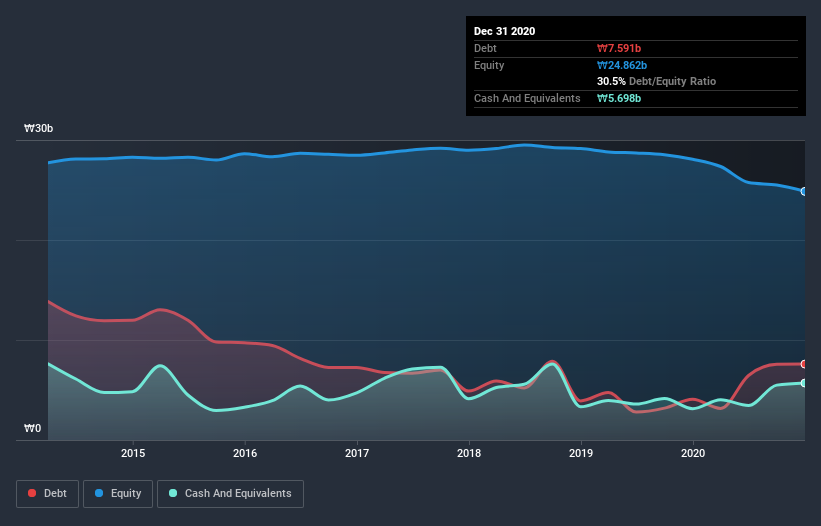- South Korea
- /
- Metals and Mining
- /
- KOSDAQ:A026910
Kwang Jin Ind (KOSDAQ:026910) Is Carrying A Fair Bit Of Debt
Legendary fund manager Li Lu (who Charlie Munger backed) once said, 'The biggest investment risk is not the volatility of prices, but whether you will suffer a permanent loss of capital.' It's only natural to consider a company's balance sheet when you examine how risky it is, since debt is often involved when a business collapses. Importantly, Kwang Jin Ind. Co., Ltd. (KOSDAQ:026910) does carry debt. But the more important question is: how much risk is that debt creating?
What Risk Does Debt Bring?
Debt is a tool to help businesses grow, but if a business is incapable of paying off its lenders, then it exists at their mercy. If things get really bad, the lenders can take control of the business. While that is not too common, we often do see indebted companies permanently diluting shareholders because lenders force them to raise capital at a distressed price. By replacing dilution, though, debt can be an extremely good tool for businesses that need capital to invest in growth at high rates of return. The first step when considering a company's debt levels is to consider its cash and debt together.
See our latest analysis for Kwang Jin Ind
What Is Kwang Jin Ind's Debt?
You can click the graphic below for the historical numbers, but it shows that as of December 2020 Kwang Jin Ind had ₩7.59b of debt, an increase on ₩4.07b, over one year. However, it also had ₩5.70b in cash, and so its net debt is ₩1.89b.

How Healthy Is Kwang Jin Ind's Balance Sheet?
Zooming in on the latest balance sheet data, we can see that Kwang Jin Ind had liabilities of ₩8.29b due within 12 months and liabilities of ₩3.07b due beyond that. Offsetting this, it had ₩5.70b in cash and ₩4.59b in receivables that were due within 12 months. So its liabilities total ₩1.08b more than the combination of its cash and short-term receivables.
Given Kwang Jin Ind has a market capitalization of ₩29.7b, it's hard to believe these liabilities pose much threat. However, we do think it is worth keeping an eye on its balance sheet strength, as it may change over time. The balance sheet is clearly the area to focus on when you are analysing debt. But you can't view debt in total isolation; since Kwang Jin Ind will need earnings to service that debt. So when considering debt, it's definitely worth looking at the earnings trend. Click here for an interactive snapshot.
In the last year Kwang Jin Ind's revenue was pretty flat, and it made a negative EBIT. While that's not too bad, we'd prefer see growth.
Caveat Emptor
Over the last twelve months Kwang Jin Ind produced an earnings before interest and tax (EBIT) loss. Indeed, it lost ₩2.4b at the EBIT level. When we look at that and recall the liabilities on its balance sheet, relative to cash, it seems unwise to us for the company to have any debt. Quite frankly we think the balance sheet is far from match-fit, although it could be improved with time. However, it doesn't help that it burned through ₩791m of cash over the last year. So suffice it to say we do consider the stock to be risky. The balance sheet is clearly the area to focus on when you are analysing debt. However, not all investment risk resides within the balance sheet - far from it. These risks can be hard to spot. Every company has them, and we've spotted 3 warning signs for Kwang Jin Ind (of which 1 shouldn't be ignored!) you should know about.
If you're interested in investing in businesses that can grow profits without the burden of debt, then check out this free list of growing businesses that have net cash on the balance sheet.
If you decide to trade Kwang Jin Ind, use the lowest-cost* platform that is rated #1 Overall by Barron’s, Interactive Brokers. Trade stocks, options, futures, forex, bonds and funds on 135 markets, all from a single integrated account. Promoted
Valuation is complex, but we're here to simplify it.
Discover if Kwang Jin Ind might be undervalued or overvalued with our detailed analysis, featuring fair value estimates, potential risks, dividends, insider trades, and its financial condition.
Access Free AnalysisThis article by Simply Wall St is general in nature. It does not constitute a recommendation to buy or sell any stock, and does not take account of your objectives, or your financial situation. We aim to bring you long-term focused analysis driven by fundamental data. Note that our analysis may not factor in the latest price-sensitive company announcements or qualitative material. Simply Wall St has no position in any stocks mentioned.
*Interactive Brokers Rated Lowest Cost Broker by StockBrokers.com Annual Online Review 2020
Have feedback on this article? Concerned about the content? Get in touch with us directly. Alternatively, email editorial-team (at) simplywallst.com.
About KOSDAQ:A026910
Kwang Jin Ind
Manufactures and sells hot rolled, cold drawn, and peeled steel bars in South Korea.
Acceptable track record and slightly overvalued.
Market Insights
Community Narratives




